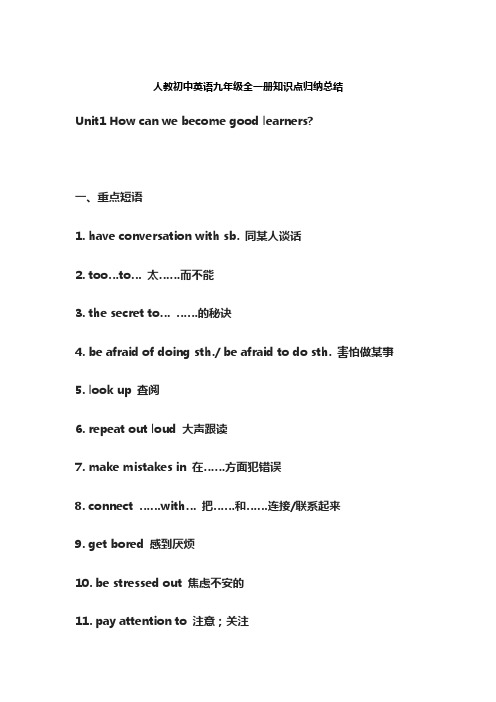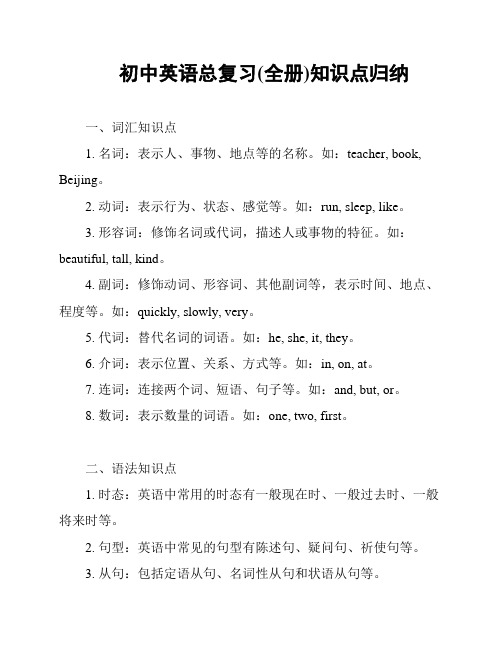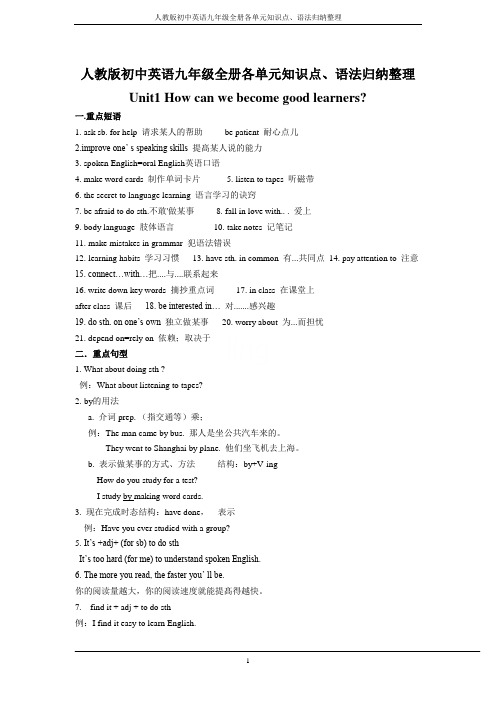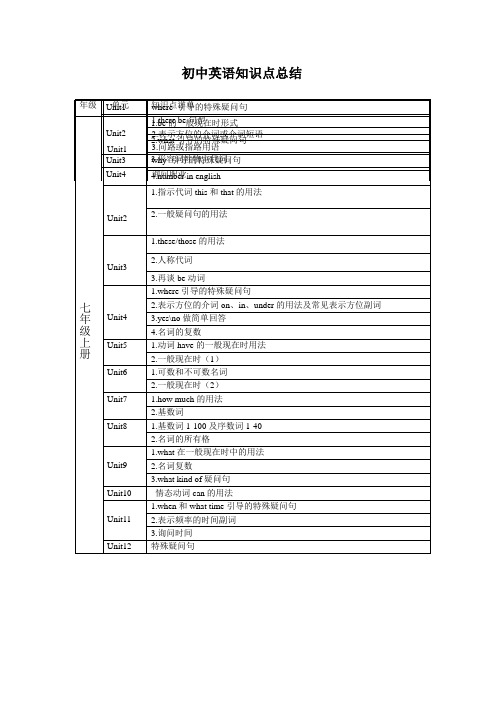初中英语教材单元知识点归纳
人教初中英语九年级全一册知识点归纳总结

人教初中英语九年级全一册知识点归纳总结Unit1 How can we become good learners?一、重点短语1. have conversation with sb. 同某人谈话2. too…to…太……而不能3. the secret to………的秘诀4. be afraid of doing sth./ be afraid to do sth. 害怕做某事5. look up 查阅6. repeat out loud 大声跟读7. make mistakes in 在……方面犯错误8. connect ……with…把……和……连接/联系起来9. get bored 感到厌烦10. be stressed out 焦虑不安的11. pay attention to 注意;关注12. depend on 取决于;依靠13. the ability to do sth.. 做某事的能力二、考点详解1. by + doing 通过……方式(by是介词,后面要跟动名词,也就是动词的ing形式)2. talk about 谈论,议论,讨论The students often talk about movie after class. 学生们常常在课后讨论电影。
talk to sb= talk with sb 与某人说话3. 提建议的句子:①What/ how about +doing sth.? 做…怎么样?(about后面要用动词的ing形式,这一点考试考的比较多)如:What/ How about going shopping?②Why don't you + do sth.? 你为什么不做…?如:Why don't you go shopping?③Why not + do sth. ? 为什么不做…?如:Why not go shopping?④Let's + do sth. 让我们做…...吧。
初中英语总复习(全册)知识点归纳

初中英语总复习(全册)知识点归纳一、词汇知识点1. 名词:表示人、事物、地点等的名称。
如:teacher, book, Beijing。
2. 动词:表示行为、状态、感觉等。
如:run, sleep, like。
3. 形容词:修饰名词或代词,描述人或事物的特征。
如:beautiful, tall, kind。
4. 副词:修饰动词、形容词、其他副词等,表示时间、地点、程度等。
如:quickly, slowly, very。
5. 代词:替代名词的词语。
如:he, she, it, they。
6. 介词:表示位置、关系、方式等。
如:in, on, at。
7. 连词:连接两个词、短语、句子等。
如:and, but, or。
8. 数词:表示数量的词语。
如:one, two, first。
二、语法知识点1. 时态:英语中常用的时态有一般现在时、一般过去时、一般将来时等。
2. 句型:英语中常见的句型有陈述句、疑问句、祈使句等。
3. 从句:包括定语从句、名词性从句和状语从句等。
4. 否定形式:在英语中通过在句子中加入否定词来表示否定的意思。
5. 疑问形式:在英语中通过改变句子语序或加入疑问词来构成疑问句。
6. 介词短语:一种由介词和它的宾语构成的结构,用来修饰名词或动词。
三、阅读技巧1. 抓主题:阅读时要注意抓住文章的主题,从中找出关键信息。
2. 理解词义:通过上下文,猜测不认识的单词的意思。
3. 推理推断:通过已知信息进行推理,得出未知信息。
4. 划重点:将文章中所述的重要信息标记出来,有助于记忆和理解。
5. 阅读速度:提高阅读速度的技巧有先读标题、段落开头和结尾。
以上是初中英语总复的知识点归纳,希望对你的复有所帮助!。
人教版初中英语分册复习知识点归纳总结

人教版初中英语分册复习知识点归纳Unit 1 School lifeLanguage points1.介词in和at的用法区分2.be动词的基本形式、肯定、否定和一般疑问句3.问路和指路的表达4.数词的读法Grammar1.现在进行时的构成及用法2.一般现在时的构成及用法Vocabulary1.学科和课程相关的词汇2.学生活动相关的词汇Unit 2 Leisure timeLanguage points1.一般过去时的构成及肯定、否定、疑问句2.名词性物主代词和形容词性物主代词的用法3.比较级的构成及用法Grammar1.过去进行时的构成及用法Vocabulary1.活动和娱乐相关的词汇Unit 3 TravellingLanguage points1.祈使句的构成及用法2.一般将来时的构成及用法3.一般现在时和一般过去时与时间状语的搭配Grammar1.现在完成时的构成及用法Vocabulary1.旅游和交通相关的词汇Unit 4 Our worldLanguage points1.一般疑问句及特殊疑问词的构成和用法2.句子的基本结构及语序的基本要求和常用变化3.祈使句和陈述句的区别和用法4.句子成分的分类及其基本特点Grammar1.直接引语和间接引语的转换Vocabulary1.环保和地理相关的词汇Unit 5 Festivals and celebrationsLanguage points1.现在完成时和一般过去时的区别及其搭配2.形容词和副词的比较级和最高级的构成及用法3.祈使句和陈述句的区别和用法Grammar1.宾语从句的引导词和语序的要求Vocabulary1.节日庆典相关的词汇以上是人教版初中英语分册的部分课程知识点和语法知识点、词汇,希望同学们能够按照这些知识点进行有策略的学习和,提高英语学习效率。
(最全)初中英语知识点归纳汇总

初中英语知识归纳总结(打印版)第一课时名词一、概述1、名词的属性:表示人或事物的名称抽象概念的词叫名词。
2、名词分普通名词和专有名词。
普通名词是表示某一类人或事物,或某种物体或抽象概念的名称。
如:teacher, desks, plates, milk, box等,专有名词表示某一特定的人、事物、地方团体、党派、国家机关、语言、节日等专用的名称。
(运用)如:China, Chinese, Saturday, June, Green, Beijing, Olympic等。
(专有名词的第一个字母要大写)二、可数名词与不可数名词1、可数名词是指表示人或事物,可以用数来计量的名词,有单复数之分。
如:glass-----glasses; book---- books2、不可数名词是指所表示的事物不能用数来计量。
如:paper, rice, water , milk, tea等。
3、有些名词在特定情况下由不可数变为可数名词。
Light travels faster than sound; (light:光线,不可数)The lights are on. (light:灯,可数)4、不可数名词的量的表示不可数名词一般无法用数来计算,前面不能用a或an或数词来表示数量,它的量往往借助于容器来表示。
如:a glass of milk ------ four glasses of milka piece of paper ------two pieces of papera bag of rice ------three bags of rice三、可数名词的复数形式(识记、运用)1、可数名词在应用时有单复数之分,单数变复数有规则变化和不规则变化两种。
规则变化policeman---policemen; man---men; woman---women;tooth---teeth; foot---feet; sheep---sheep; deer---deer;Japanese--- Japanese; Chinese --- Chinese; fish --- fish四、名词所有格(运用)名词的所有格是表示所有关系的形式,它也有构成上的变化。
初中英语知识点总结归纳

初中英语知识点总结归纳
Unit 1 一、知识点 1.Check in : 在旅馆的登记入住。 Check out: 在旅馆结账离开。
2.By: ①通过…..方式(途径) 。例:I learn English by listening to tapes. ②在…..旁边。例:by the window/the door ③乘坐交通工具 例:by bus/car ④在……之前,到……为止。例:by October 在 10 月前 ⑤被 例:English is spoken by many people. 3.how 与 what 的区别: how 通常对方式或程度提问,意思有:怎么样 如何,通常用来做状语、表语。 what 通常对动作的发出者或接受者提问,意思为 什么,通常做宾语,主语。 ①How is your summer holiday? It’s OK.(how 表示程度 做表语) ②How did you travel around the world? I travel by air.
b
I need a pen to write with.
b
I need some paper to write on.
I don’t have a room to live in.
10. practice , fun 做名词为不可数名词 11. add 补充说 又说 12. join 加入某团体 并成为其中一员 attend 出席参加会议或讲座
b
b
17.a,an 与序数词连用表示“又一” , “再一” 。 例:Please give me a second apple. There comes a fifth girl.
18.have trouble/difficult/problem (in) doing….. 干…..遇到麻烦,困难 19.unless 除非,如果不,等于“if not”本身就表示否定,引导条件状语从句,主句为将 来时,条件状语从句用一般现在时表示将来。 例:My baby sister doesn’t cry unless she’s hungry. =My baby sister doesn’t cry if she isn’t hungry. Unless you take more care, you’ll have an accident. 如果你不多加小心的话,你会出事的。 20.instead: adv. 代替,更换。 例:We have no coffee, would you like tea instead? 我们没有咖啡了,改喝茶好吗? It will take days by car, so let’s fly instead. 开车去要好几天呢,咱们还是坐飞机吧。 Tom was ill, so I went instead.汤姆病了,所以换了我去。
人教版初中英语九年级全册各单元知识点、语法归纳整理

人教版初中英语九年级全册各单元知识点、语法归纳整理Unit1 How can we become good learners?一.重点短语1. ask sb. for help 请求某人的帮助be patient 耐心点儿2.improve one’ s speaking skills 提髙某人说的能力3. spoken English=oral English英语口语4. make word cards 制作单词卡片5. listen to tapes 听磁带6. the secret to language learning 语言学习的诀窍7. be afraid to do sth.不敢'做某事8. fall in love with.. . 爱上9. body language 肢体语言10. take notes 记笔记11.make mistakes in grammar 犯语法错误12.learning habits 学习习惯13. have sth. in common 有...共同点14. pay attention to 注意15. connect…with…把....与....联系起来16. write down key words 摘抄重点词17. in class 在课堂上after class 课后18. be interested in… 对.......感兴趣19. do sth. on one’s own 独立做某事20. worry about 为...而担忧21. depend on=rely on 依赖;取决于二.重点句型1. What about doing sth ?例:What about listening to tapes?2.by的用法a. 介词 prep. (指交通等)乘;例:The man came by bus. 那人是坐公共汽车来的。
(绝对经典)初中英语各单元知识点概要

初中英语知识点总结年级单元知识点详单七年级上册Unit11.be的一般现在时形式2.what引导的特殊疑问句3.形容词性物主代词4.number in englishUnit21.指示代词this和that的用法2.一般疑问句的用法Unit31.these/those的用法2.人称代词3.再谈be动词Unit41.where引导的特殊疑问句2.表示方位的介词on、in、under的用法及常见表示方位副词3.yes\no做简单回答4.名词的复数Unit5 1.动词have的一般现在时用法2.一般现在时(1)Unit6 1.可数和不可数名词2.一般现在时(2)Unit7 1.how much的用法2.基数词Unit8 1.基数词1-100及序数词1-402.名词的所有格Unit91.what在一般现在时中的用法2.名词复数3.what kind of疑问句Unit10 情态动词can的用法Unit111.when和what time引导的特殊疑问句2.表示频率的时间副词3.询问时间Unit12 特殊疑问句Unit1 where 引导的特殊疑问句Unit21.there be句型2.表示方位的介词或介词短语3.问路或指路用语Unit3 why 引导的特殊疑问句Unit4 询问职业七年级下册Unit6 1.询问天气2.现在进行时(2)Unit7 描述人的外部特征Unit81.would like 的用法2.可数名词与不可数名词Unit9 一般过去时(1)Unit10 一般过去时(2)Unit11 询问看法及喜爱和厌恶用语Unit12 祈使句八年级上册Unit1 1.一般现在时2.how often/how soon Unit2 情态动词Unit3 一般将来时Unit4 how及基数词的构成Unit5 情态动词canUnit6 形容词的比较级Unit7 1.How many\how much2.how引导的特殊疑问句Unit8 一般过去时Unit9 how引导的特殊疑问句Unit10 复习一般将来时的用法Unit11 Could you please的用法Unit12 1.复习比较级2.学习最高级八年级下册Unit1 一般将来时Unit2 情态动词could,should的用法Unit3 1.when,where的时间状语从句2.过去进行时Unit4 直接引语和间接引语Unit5 1.be doing ,be going to,will在表示将来式上的区别2.IF引导的时间状语从句Unit5 现在进行时(1)Unit6 1.现在完成进行时2.一般过去时和现在进行时Unit7 Would you mind的用法Unit8 1.现在完成时2.征求意见和提出建议的表达Unit9 1.现在完成时的“完成用法”和未完成用法2现在完成时态中要注意的问题Unit10 反意疑问句九年级全册Unit11.by+doing结构2.现在完成时Unit2 “used to+动词原形”表示过去的习惯Unit3 1. 被动语态2. should be allowed to do sthUnit4 虚拟语气(if引导的非真实性条件状语从句)Unit5 情态动词表示推测。
最全面人教版七年级上册英语第一单元知识点归纳总结

Unit 1 My name f s Gina.一、词汇与短语团重点单词A部分1. name n.名字:名称2. nice adj.令人愉快的:宜人的3. to常用于词原之前,表示该动词为不定式,4. meet v.遇见;相逢5. too adv 也:又;太6. your pron.你的;你们的7. Ms.(用于女子姓氏姓名前,不指明婚否)女士8. his pron•他的9. and conj.和:又;而10. her pron.她的11. yes interj.是的;可以12. she pron.她13. he pron.他14. No adv.不:没有:不是15. not adv.不:没有B部分1. zero num.零2. one num.一3. two num.二4. three num.三5. four num.四6. five num.五7. six num.六8. seven num.七9. eight num. 7k 10. nine num.九11. ten num.十12. telephone n.电话;电话机13. number n.号码:数字14. phone n.电话;电话机15. first adj.第一16. last adj.最后的;末尾的17. friend n.朋友18. China 中国19. middle adj.中间的n.中间20. school n.学校目重点短语A部分1. your name你的名字2. her name她的名字3. his name他的名字4. my name我的名字B部分1. first name/given name 名字2. last name/family name/sumame 姓3. middle name 中名4. a middle school 一所中学/初中5. in China在中国6. my friend我的朋友7. telephone/phone number 电话号码0重点句子A部分1.Hi. My name is Gina. / I am Gina. 嗨。
- 1、下载文档前请自行甄别文档内容的完整性,平台不提供额外的编辑、内容补充、找答案等附加服务。
- 2、"仅部分预览"的文档,不可在线预览部分如存在完整性等问题,可反馈申请退款(可完整预览的文档不适用该条件!)。
- 3、如文档侵犯您的权益,请联系客服反馈,我们会尽快为您处理(人工客服工作时间:9:00-18:30)。
第一章七年级上Unit 1-4一、Unit 1知识点1.语法:be动词/ 物主代词/ 人称代词(详见语法)2.句型/词汇(1) --- What’s your name?--- My name is … / I am …注意:人称要用物主代词eg:---What’s his name ?--- His name is Tony.☆英文中姓氏是写在后面,名字在前面eg:Jenny Brown↓ ↓名字姓氏姓氏:last name = family name名字:first name(2) --- Nice to meet you !--- Nice to meet you, too. /Me, too.(3) ---What’s your telephone number?--- My telephone number is …It’s…二、Unit 2 - Unit 3知识点1.语法:指示代词/名词的单复数(详见语法)2.句型/词汇(1) ---Is this / that….? --- Are these/ those …?--- It is …(回答都用It) --- They are…(回答都用They) eg:--- Is this your ruler?--- No, it isn’t .辨析:this (复数these) 这个,这样(这些)→指近处的事物,人that (复数those) 那个,那样(那些)→指远处的事物,人eg:---Is this your pencil? ---Is that your book?--- Yes, It is. --- No, it is not.(2)陈述句型This is my sister . That is my brother.These are my sisters. Those are my brothers.注意单数→复数:指示代词,be 动词,名词全都要相应的变化(3) ---What’s this in English?---It is a pen. (注意冠词不要省略)(4) --- How do you spell it?--- P-E-N.(5) Call Alan at 4953539.(6)易错单词,短语,句子eraser dictionarya set of keys in the lost and found caseHere you are. Here’s your baseball.(7)Thank you for 的用法Thank you for sth/ doing stheg:Thanks for the photo of your familyThanks for showing me the school last week.(八上Unit12)三、Unit 4知识点1.语法:定冠词/地点介词/ 殊疑问句(详见语法)2.句型/词汇(1) ---Where’s the backpack?--- It’s under the table. (定冠词,be动词不可丢)(2) ---Can you do….?--- Yes, I can. / No, I can’teg:Can you bring some things to school?(3) How about/ what about …+名词,代词,动名词?eg:How about my books?How about you?How about playing basketball?(4)辨析bring/ takebring 强调“带来” take 强调“拿走”eg:Can you bring some things to school?Please take these things to your sister.(5) need:名词“需要,必要,缺乏”及物动词need to to sth情态动词need +动词原形eg:There is no need for you to be anxiousI need my hat--- Need I go?--- Yes, Imust. No, I needn’t↓ ↓肯定回答否定回答(6)辨析too/either/alsotoo “也”, 放肯定句句末either “也”, 放否定句句末also 位置通常接近动词,不放在句末eg:Are they on the bookcase, too?Aren’t they on the bookcase, either?He also plays the piano.Exercise一、单选题1.______ woman in a red dress is a very popular teacher in our school.A. AB. TheC. /2.--- Is this Lucy’s schoolbag?--- No, it’s not _______. It’s ________.A. her, mineB. hers, mineC. hers, my3.---What’s t his in English?--- _______ a pen.A. It’sB. ItC. Its4.These _______ my friends.A.wereB. isC. are5.Please ___________ these things to your sister.A. takeB. bringC. get6.----__________ are his keys?---- They’re on the table.A. WhatB. WhenC. Where7. ---Are they on the bed?--- No, they _________.A. areB. aren’tC. isn’t8.---How do you ________ it?--- P-E-NA. writeB. readC. spell9. Call Alan _______ 495-3539.A. atB. onC. in10.---What’s this?--- It’s _______ watch.A. theB. aC. an二、情景交际(每空一词)。
(一) Linda:Good morning, boys. 1 name is Linda. 2 your name?Tom:My name 3 Tom. Nice to 4 you!Linda: 5 ,too.Tom:Linda, what’s 6 phone number?Linda:7 398-8042.Tom:By the way, 8 this your backpack?Linda:No, it 9 . 10 _is my watch.(二) Mom:Hello!Tony:Hi, mom. I 1 some things for class this afternoon. Can you 2 them to school 3 me, please ?Mom:Sure.Tony:I need my math book.Mom:Math book? 4 is your math book?Tony:Oh, it’s on the dresser. And I need my 5 (尺子). It’s under the bed. And my6 (笔记本).Mom:where’s your notebook?Tony:Uh, I don’t know. Oh...yeah, it’s 7 the bed. And my CDs. They‘re on the bookcase.Mom:Ok!Tony:And the video tape. It’s on the table. I need to 8 it back to the store9 school.Mom:Ok. I‘ll 10 you twelve o’clock.三、根据要求完成句子1.This is my parent. (改复数)2.谢谢你的全家福。
Thanks ___________________________________ your family.3.---你们的课本在哪里?---他们在椅子上.___________________________________ books?_____________________________4.请把这些东西带给你姐姐。
Please5.我需要我的帽子,笔记本和一只笔。
第二章七年级上Unit 5-8一、Unit 5知识点1.语法(1)注意助动词,冠词(a/an)备注:(详见语法)(2)注意第三人称单数:---Do you have a TV ? ---Yes, I do/No, I don’t---Dose he have a tennis racket ?---Yes,he does./No,he doesn’t eg:I have a soccer.He has a soccer.2.句型/词汇(1)Let sb do stheg:---Let’s play soccer.---That sounds good./That souds interesting.注意adj ing结尾和ed的区别ing用于物,ed用于人eg:interesing/interested(2)球类前不能加the (eg:play soccer.)(3)many 后接可数名词eg:We have many sports.much 后接不可数名词eg:We have much milk.(4)and more 意思为更多,等等(5)重点句:Ed Smith has a great sports collection.He only watches them on TV.(6)背默P30 3二、Unit 6知识点1.语法:注意可数和不可数名词(详见语法)2.句型(1)like sth eg:Do you like bananas ?否定句not的位置eg:I don’t like bananas.(2)lots of = a lot of 后面可接可数名词和不可数名词eg:Runing star Sandra Clark eats lots of healthy food.(3)for 加一日三餐eg:for lunch三、Unit 7知识点1.句型(1)How much 后加可数或不可数名词,询问价格。
